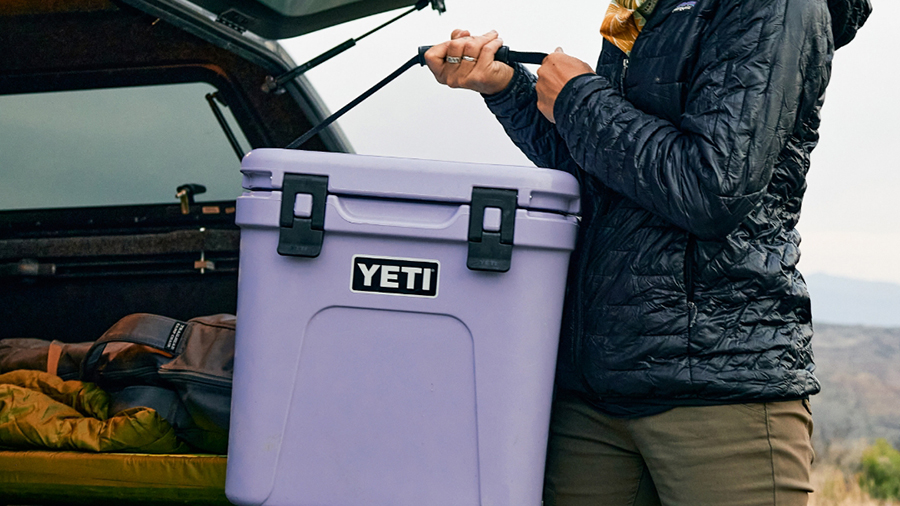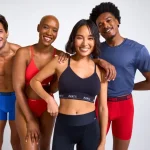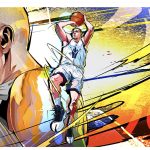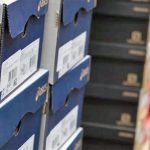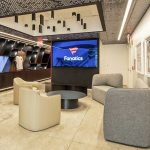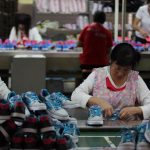Shares of Yeti Holdings rose about 17.3 percent Thursday after the drinkware and cooler maker raised its guidance for the year after second-quarter results handily topped Wall Street targets. Speaking to analysts, Matt Reintjes, president and CEO of Yeti Holdings, predicted a return to double-digit growth in the fourth quarter as the firm recovers from a massive recall and taps success with newer product families and line extensions.
Shares closed at $46.42, up $6.86, on the day.
In March, Yeti announced that about 1.9 million Yeti brand coolers and soft gear cases were being recalled because various products’ magnet closures could detach and cause injury. The recall included the Yeti Coolers Hopper M30 Soft Cooler 1.0 and 2.0, Hopper M20 Soft Backpack Cooler, and SideKick Dry Gear Case, a smaller sealed bag that protects items from water damage.
Due to the recall, soft coolers and gear bags have been out of the market for the majority of 2023.
On Yeti’s Q2 analyst call, Reintjes said the company remains on track to reintroduce the M20 backpack, the M30 tote and SideKick Dry Gear bag in the fourth quarter. Smaller sizes for each style of soft cooler will also be introduced in the fourth quarter and sizes in the SideKick Dry Gear bag line will be extended in early 2024. He said, “I would like to thank our Yeti employees, partners and customers for their tremendous focus and execution throughout this effort to get these products back to market.”
Regarding overall consumer demand, Reintjes said Yeti continues to see diverse performances across its wholesale and DTC channels, but underlying demand for its products remains strong.
“There remains a focus on drinkware with strong trends around hydration, color and new styles,” said Reintjes. “We’re seeing this play out within our own portfolio and across specific consumer demographics. Customers are increasingly gravitating towards many newer formats of our bottles, straw-lid tumblers and our new color-match bottle. As we continue to grow and diversify our drinkware category, we’ve expanded our products to include new size and customization offerings across a range of Yonder water bottles and we’re pleased with the highly successful introduction of our Rambler Beverage Bucket.”
He added, “In hard coolers, we saw strength this past quarter, particularly with our expanded line of wheeled coolers. Offering mobile options will continue to unlock opportunities across customers and geographies and we’re excited about the innovation pipeline of both soft and hard coolers. Yeti is well positioned to win across our product categories and we’re focused on our product development and marketing to take advantage of the trends we view as long-term.”
In the second quarter ended July 1, sales decreased 4.1 percent to $402.6 million, impacted by $24.5 million due to a recall reserve adjustment. Adjusted sales, which exclude the recall reserve impact, increased 2 percent to $427.1 million, exceeding analysts’ consensus estimate of $411.8 million.
Reintjes said the gains reflected ”solid growth within the rest of the portfolio” outside soft coolers and he noted that Yeti was comping against “a very-strong year-ago period, particularly in wholesale and corporate sales.”
Net income declined 17.7 percent to $38.1 million, 44 cents a share, with the decline reflecting the recall reserve adjustment. On an adjusted basis, net income was off 9.1 percent to $54.8 million, or 57 cents, topping Wall Street’s consensus estimate of 46 cents.
The quarterly beat was due to better-than-expected gross margins due to lower inbound freight and lower product costs, partially offset by other costs, including higher customization costs and the unfavorable impact of foreign currency exchange rates. On a reported basis, gross margins improved 110 basis points to 53.4 percent. On an adjusted basis, excluding the recall reserve adjustment, gross margins gained 270 basis points to 54.9 percent.
“We’re delivering against what we’ve said as it relates to gross margin expansion,” said Reintjes. “Importantly, we are now on pace to exceed our initial gross margin outlook for the year and we see momentum here into 2024. At the same time, as has been our pattern, we continue to invest across our business. We remain focused on the many growth opportunities ahead as we see the impact of product brand and channel expansion.”
SG&A expenses increased 9 percent to $164.5 million, including a $10.7 million favorable impact related to the recall reserve adjustment. As a percent of sales, SG&A expenses increased 500 basis points to 40.9 percent. The increase was due to higher employee costs, including incentive compensation and new hires to support future growth, as well as increased marketing, and warehousing costs. Variable expenses increased primarily due to the increased mix of its Amazon Marketplace business. On an adjusted sales basis, adjusted SG&A expenses increased 450 basis points to 39.1 percent.
Operating income decreased 26.4 percent to $50.3 million while adjusted operating earnings fell 9.1 percent to $67.1 million.
By channel, direct-to-consumer (DTC) sales inched up 0.7 percent to $226.4 million. Excluding the recall reserve, DTC channel sales rose 4.3 percent to $234.5 million. Gains at Amazon and e-commerce offset softer corporate sales, which faced tough year-ago comparisons.
Wholesale channel sales decreased 9.7 percent to $176.2 million, including a $16.4 million recall reserve adjustment impact. Excluding the unfavorable impact of the recall reserve adjustment, wholesale channel sales decreased 1.4 percent to $192.5 million.
Reintjes said wholesale came in better than planned, supported by positive sell-through excluding the soft cooler impact, and the initial shipments of specific fall products. Yeti decided to move its fall limited-edition launch of lilac and camp green colorways to early Q3 “sensing we had a winner ready to go,” and the launch saw a strong reception.
Drinkware sales increased 8.0 percent to $233.4 million in the quarter, reflecting strong demand for Rambler bottles as well as the introduction of new Yonder bottles, Rambler straw-lid mugs, the new Rambler Beverage Bucket, and new seasonal colorways. The gains were led by the “DTC channel and great reception to our product innovation,” said Reintjes.
Coolers & Equipment sales decreased 19.0 percent to $156.6 million, including a $24.5 million recall reserve adjustment. On an adjusted basis, Coolers & Equipment sales decreased 6.4 percent to $181.1 million as the category lapped 2022’s full introduction of the M20 and M30 soft coolers and the absence of those products this year. The M20 and M30 absence was partly offset by a strong performance in hard coolers, soft coolers that were not impacted by the recalls, and cargo.
Discussing strategic priorities, Reintjes noted that Yeti continues to expand its audience reach with 15 distinct communities. The brand leveraged its reach into barbecue and live fire cooking enthusiasts to extend into the broader culinary space with the signing of Genevieve Taylor, founder of Bristol Fire School and a U.K. culinary voice, and Gil Meller, an outdoor chef, food show host and author, as ambassadors. Yeti also reached partnerships with several YouTube channels in the culinary space.
Yeti is also seeking to tap seasonal buying moments beyond moms, dads and graduates, said Reintjes. Around sustainability, Yeti recently launched two circularity programs, Yeti Rescues and Rambler Buyback, and rolled out a single-use campaign across out-of-home media placement and at several music festivals, including last weekend’s Lollapalooza in Chicago.
On product innovation, Reintjes said its drinkware business had benefited from becoming “meaningfully diversified” over the past ten years, including not only form factors, colors and sizing, but by broadening use environments and use cases.
“We are seeing great reception to our bottle assortment with excellent early results of the color-matched options available across a wider range of our models,” said Reintjes. “Our expansion into both smaller and larger size hydration has enhanced the breadth and reach of our products.”
Also seeing a healthy reception has been extended sizes and lids solutions to its travel mug and Yodder water bottles. Beyond traditional drinkware, the Rambler Beverage Bucket debut “performed incredibly well.”
Yeti plans to launch a Yeti cocktail shaker that Reintjes offered as an example of how the brand is extending to more use cases. Yeti also partnered with Butter Pat Industries to launch a 12″ Cast Iron Skillet that earned the third-highest social engagement for a Yeti product release since 2015.
On the cooler side, hard coolers performed well during the quarter, led by the Roadie 48 and Roadie 60 wheeled coolers. Combined with the Tundra Haul, the volume of wheeled coolers more than doubled from last year. In soft coolers, the Hopper Flip posted strong growth ahead of the upcoming relaunch of the M20 and M30 in Q4 and return of the SideKick Drive Gear Case.
Outside of coolers, strong results are coming from its expanded GoBox cargo line. Bags continue to be expanded across wholesale accounts with a colorway extension planned for the second half.
Exploring its omni-channel progress, DTC growth was led by Amazon with the platform continuing to benefit from its “wide reach” across customer bases.
Yeti.com continues to focus on simplifying the buying decision, enhancing the customization process, and creating more personalized experiences. Reintjes said, “From a practical perspective, this means we continue to provide a dynamic website that will best match product and content with the individual customer.”
Corporate sales were flat against “very strong” year-ago comparisons although the customer count still expanded. Reintjes said, “This remains an important channel for us and we are confident in driving growth here given the product interest, strengthening backlogs, and untapped international opportunities.”
Yeti’s retail stores continue to drive the highest rate of new customers across DTC channels. During the third quarter, Yeti will open its 15th and 16th stores in San Jose, CA and Minneapolis, MN.
Wholesale outperformed due to earlier shipments of the lilac and camp green fall colorways and combined Q2 and Q3 wholesale results are expected to remain in line with prior expectations.
International sales grew nearly 20 percent for the quarter to reach 13.4 percent of sales up from 11.5 percent in last year’s Q2. Continued “robust” growth in Australia and Europe offset slower growth in Canada that’s performing similarly to the U.S. region.
Inventory decreased 34 percent to $322.0 million year over year. On a sequential basis, inventory decreased $25.0 million, marking the fourth consecutive quarter with a sequential decline in its inventory balance.
For 2023, the updated guidance calls for:
- Adjusted sales to increase between 4 percent and 5 percent (versus the previous outlook of between 3 percent and 5 percent) with growth weighted to the second half of the year;
- Adjusted operating income as a percent of adjusted sales between 15.5 percent and 16.0 percent (versus the previous outlook of between 15.0 percent and 15.5 percent). The benefit from the adjusted gross margin expansion is expected to be more than offset by the deleverage from increases in adjusted SG&A expenses due to strategic investments and the unfavorable topline impact from the stop sale of the products affected by the recalls’
- Adjusted EPS between $2.23 and $2.32 (versus the previous outlook of between $2.12 and $2.23), reflecting a 2 percent to 6 percent decrease, with earnings growth beginning in the fourth quarter.
Photo courtesy Yeti Holdings

